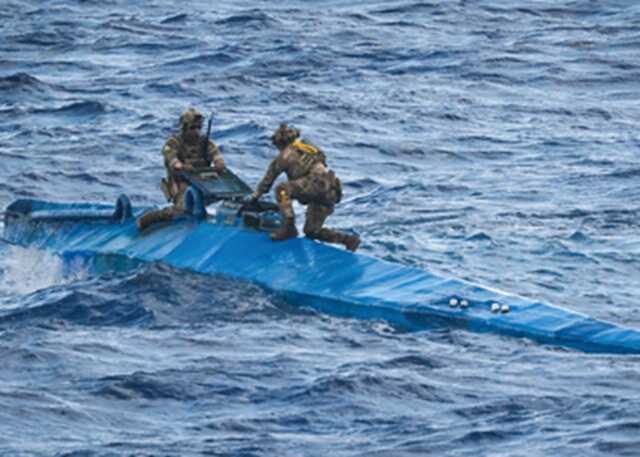
The Caribbean, historically a key region for drug trafficking, has once again become the center of attention with the seizure of a narco-submarine, signaling the use of these types of vessels is potentially becoming a more common tactic for drug shipments in this smuggling route.
On September 12, British authorities reported that the Royal Navy’s HMS Trent intercepted and seized 2 tons of cocaine from a speedboat and a semi-submersible in the Caribbean Sea, south of the Dominican Republic. The August 26 operation was conducted in collaboration with U.S. authorities and resulted in the arrest of 11 individuals, all now facing drug trafficking charges. The origin of the narco-submarine and the nationality of those arrested remain undisclosed.
Initially, these vessels were rudimentary, often built in the jungles of Colombia, and primarily transported drugs along the Colombian Pacific coast. As construction techniques evolve, drug trafficking organizations have expanded their operations to ship drugs to Europe and North America. The vessels also originate from Guyana, Suriname, Venezuela and northern Brazil.
While the Caribbean has seen fewer narco-submarines compared to the Pacific, it is not unfamiliar with them. In 2011, Honduran authorities seized 6.6 tons of cocaine from a submarine near the Nicaraguan border. Between 2006 and 2012, the U.S. Coast Guard intercepted at least five of these vessels in the region.
InSight Crime Analysis
The interception of a narco-submarine in Caribbean waters may signal a shift in drug trafficking routes and demonstrate the growing sophistication of tactics used by criminal networks in the region. This incident underscores the strategic importance of the Caribbean for transnational crime organizations.
The Caribbean has long been a crucial drug trafficking corridor due to its proximity to South America’s cocaine producers such as Colombia. For decades, traffickers relied on speedboats, small planes, recreational vessels, and commercial ships to move drugs through the Caribbean.
While narco-submarines are fairly new to the Caribbean, their presence is not unprecedented, according to Sjoerd Top, executive director of the Maritime Analysis and Operations Centre (MAOC). The appearance of a narco-submarine in the region “is not a new trend or an isolated incident, as we have seen similar vessels originating from Brazil or Colombia,” he told InSight Crime.
“If they succeed with one route, they try to replicate it on others,” he added.
Although traditionally associated with Pacific routes, the emergence of narco-submarines in the Caribbean is tied to the need for criminal groups to adapt to intensified maritime security operations. These operations, involving forces such as the Royal Navy, the US Coast Guard, local Caribbean officials, and European authorities from nations with territories in the region, like France and the Netherlands, have made conventional smuggling methods increasingly risky.
In this context, the use of narco-submarines in the Caribbean may be a direct response to heightened interdiction efforts. Drug trafficking networks are turning to advanced technologies to avoid detection.
‘’Due to all the efforts that law enforcement and governments are making to disrupt drug trafficking and other illicit goods, organized crime groups are evolving and attempting to use narco-submarines,” Top explained.
Recent military and police operations, along with increased patrols, reflect a significant escalation of efforts to combat drug trafficking in these waters.
The successful seizure of the narco-submarine by British authorities may also be due to enhanced international cooperation and improved intelligence-sharing among authorities in the region. This collaboration has bolstered efforts to combat drug trafficking, as demonstrated by the increased cocaine seizures in the French Caribbean as a result of joint efforts by French and Venezuelan authorities. Likewise, partnerships in Guyana with international actors have boosted anti-narcotics operations, despite local limitations.
A prime example is the recent seizure of 4.4 tons of cocaine in Guyana, reflecting the increasing international interest of law enforcement in the region.
“Without international cooperation, achievements like this wouldn’t be possible. At MAOC, I can say that in two-thirds of cases, the seizures are carried out by a different country or agency than the one that initially gathered the intelligence,” Top noted.
This cooperation extends beyond intelligence-sharing. “Each time a country finds a semi-submersible, we all learn from it,” Top explained. With growing international attention and involvement in the region, further cocaine seizures and more frequent interceptions of narco-submarines are likely.